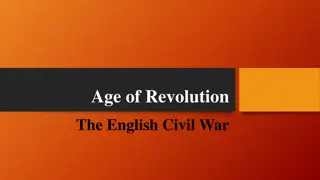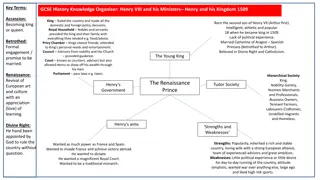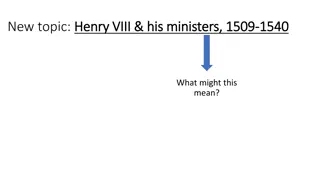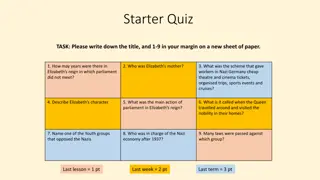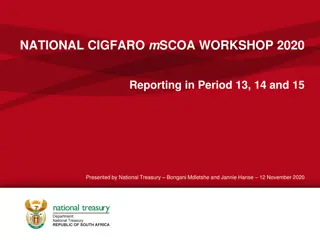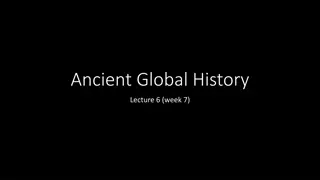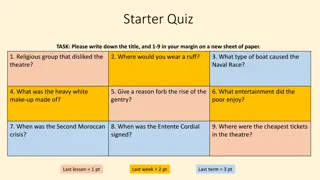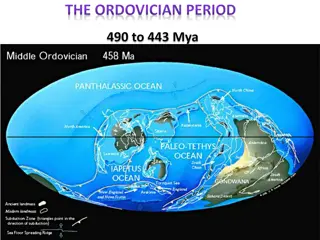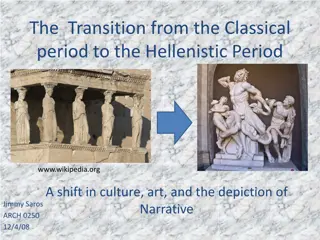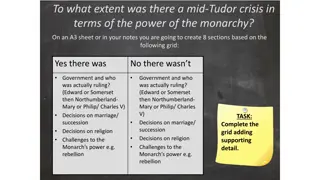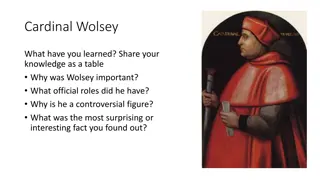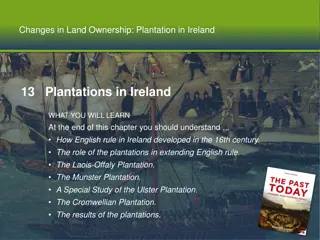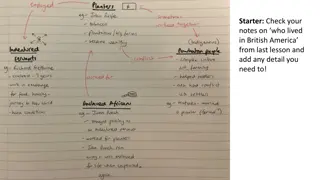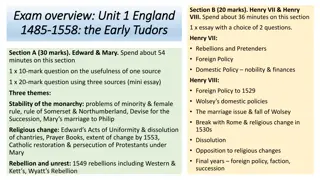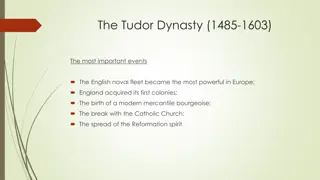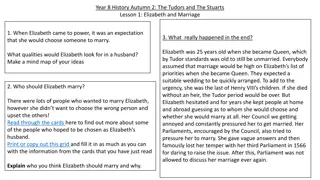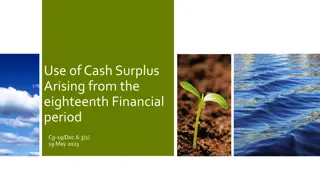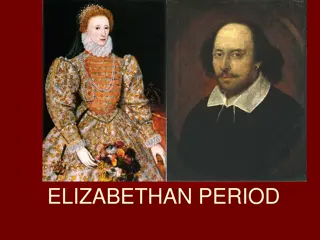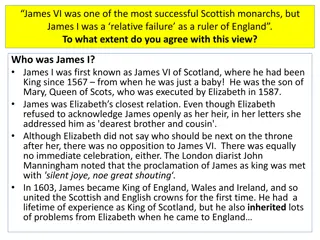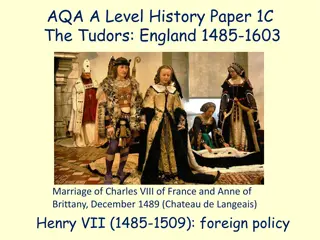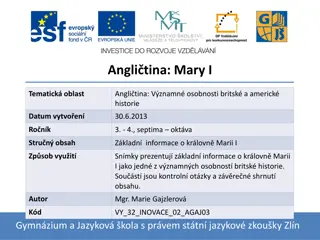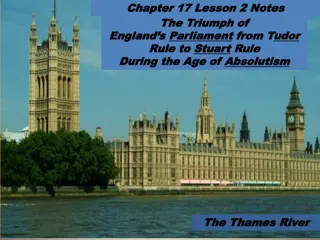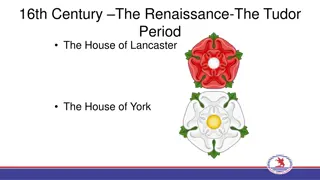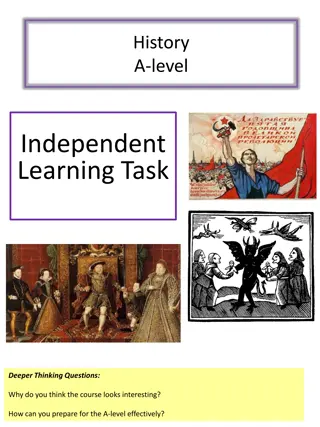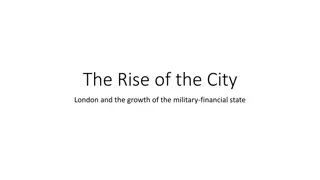Georgia's Trustee Period: Role of Salzburgers and Highland Scots
Evaluate the Trustee Period of Georgia's colonial history, highlighting the significant roles played by the Salzburgers, Highland Scots, malcontents, and the Spanish threat from Florida. This period marked a unique and unsuccessful social and economic time for Georgia, showcasing the transition from
0 views • 28 slides
Cultural History of India: Early Vedic Period and Aryans
The period of the Aryans in ancient India marked a transition from the Indus Valley Civilization to the Vedic Civilization. The Aryans, possibly migrants from various regions, integrated with the indigenous Dravidians to form the Vedic society. Their culture, as depicted in the Vedas and epics like
0 views • 10 slides
The English Civil War and the Rise of the Stuart Dynasty
The English Civil War marked the end of the Tudor dynasty and the rise of the Stuart Dynasty in England. It was a time of conflict between the monarchy and Parliament, with issues revolving around divine right, religion, and political power. Leaders like James I and Charles I faced opposition from P
0 views • 13 slides
Henry VIII and Cardinal Wolsey: Key Figures in Tudor England
Henry VIII, a key monarch in Tudor England, ruled with ambition and a desire for power and glory. His reign saw a close relationship with Cardinal Wolsey, his chief minister, who rose from humble beginnings to become a powerful figure in both domestic and foreign policies. Wolsey's reforms and influ
0 views • 13 slides
Create a Model Tudor House: A Fun and Educational Activity
Explore the world of Tudor houses by designing and creating a model Tudor house using simple materials found at home. Follow the steps outlined to draw a design, gather materials, and construct your Tudor house model over a span of two days, with the freedom to tweak your design as you progress. Uti
0 views • 7 slides
Tudor England: Henry VIII and His Ministers, 1509-1540
Explore the reign of Henry VIII and his key ministers, including Cardinal Wolsey and Thomas Cromwell, from 1509 to 1540. Dive into the political dynamics, the influence of the Reformation, and the societal landscape of Tudor England during this transformative period.
0 views • 22 slides
The Impact of Political and Social Revolution in the Romantic Period (1785-1830)
England underwent significant changes during the Romantic Period (1785-1830) as it transitioned from an agricultural to an industrial nation, shifting economic power dynamics. This period was marked by wars, inflation, and social upheaval, leading to a revolution in literature and a focus on inner e
1 views • 14 slides
Challenges Faced by Female Rulers in History
The challenges encountered by female rulers in history, like Queen Elizabeth I, are explored in this content. From societal attitudes towards women in Tudor times to the pressures to marry and produce heirs, the struggles faced by female monarchs are highlighted. The content delves into historical e
0 views • 10 slides
England's Restoration Period and the Rise of the British Empire
England saw significant historical events during the Restoration Period and the eighteenth century. From Charles II's restoration to the Glorious Revolution, the Act of Union of 1707, and the rise of British dominions worldwide, this era marked political stability, literary contributions, and the gr
1 views • 22 slides
Period Control Guidelines in mSCOA Reporting Workshops 2020
This workshop presented by National Treasury focuses on period control within the mSCOA environment, specifically covering periods 13, 14, and 15. The session addresses requirements for monthly period closures, year-end procedures, corrections in period 15, and AFS submission guidelines for the fina
0 views • 17 slides
The Axial Age: Pivotal Thinkers Across Ancient Civilizations
The Axial Age, coined by Karl Jaspers, refers to a period from the 8th to 3rd century BCE where pivotal thinkers emerged independently in Persia, India, China, Greece, and Rome, shaping the spiritual foundations of humanity. Jaspers, a German philosopher and psychiatrist, highlighted the importance
2 views • 21 slides
Understanding the Period of Lighthouse Patterns
Lighthouses play a crucial role in guiding sea ships at night with their unique light beacon patterns. By identifying the period of these patterns, we can extend the diagrams accurately. In this mathematics unit, we delve into determining the period of a lighthouse pattern based on its alternating l
0 views • 16 slides
Crimes and Punishments in Tudor Stuart Times
Investigate crimes and punishments in Tudor Stuart times, exploring the harsh laws, cruel punishments, and the role of Justice of the Peace. Compare Tudor punishments with modern methods, examining the reasons behind the severity of punishments and the use of torture. Discover how criminals were dea
0 views • 12 slides
Understanding Poverty in Elizabethan England
The poor in Tudor England faced harsh living conditions, with the working poor comprising half of all families. Illiterate and landless, they spent most of their income on basic needs, struggling to survive. The poverty crisis was exacerbated by factors like rising population, inflation, trade issue
0 views • 12 slides
Evolutionary Insights from the Ordovician Period
The Ordovician period was marked by significant events such as the average temperature and atmospheric CO2 levels, the emergence of diverse life forms, glacial events leading to mass extinctions, and the survival of the fittest in evolving environments. Primitive reefs, major evolutionary radiation
0 views • 12 slides
Understanding the Neonatal Period: Care and Evaluation
The neonatal period, also known as the newborn stage, encompasses the first 28 days of a baby’s life, characterized by rapid changes and fragility. This crucial stage requires specialized care, with sub-divisions such as the Period of the Partunate and Period of the Neonate. Commonly, neonates may
0 views • 19 slides
Transition from Classical to Hellenistic Period: Art and Narratives
The evolution from the Classical period to the Hellenistic period in Ancient Greece brought significant shifts in culture, art, and storytelling. Classical art focused on idealized human forms and naturalistic poses, while Hellenistic art embraced more dramatic expressions and emotions. The narrativ
0 views • 23 slides
Examination of the Mid-Tudor Crisis: Power Struggles and Challenges to Monarchy
The mid-Tudor era witnessed a crisis in the power of the monarchy, as evident through issues of government authority, decisions on marriage and succession, religious policy, and challenges to royal power. The complexities of ruling under Edward VI, Mary I, and their advisors, along with crucial even
0 views • 16 slides
Cardinal Wolsey: The Influential Figure in Tudor England
Cardinal Wolsey was a significant figure in Tudor England, holding various official roles such as Lord Chancellor and Chief Minister to King Henry VIII. He was appointed Cardinal in 1518, wielding both religious and political power. Wolsey's controversial nature stemmed from his influence on the Pop
0 views • 17 slides
Stunning Images of Hampton Court Palace in London
Explore a captivating collection of images showcasing the beauty and grandeur of Hampton Court Palace in London. From the majestic Great Gatehouse and Moat Bridge to the intricate Tudor Style Chimneys, immerse yourself in the rich history and architecture of this iconic landmark. Witness the charm o
0 views • 37 slides
Plantations in Ireland: Development of English Rule in the 16th Century
Dive into the historical significance of plantations in Ireland during the 16th century, understanding how English rule evolved, the various plantations established like Laois-Offaly and Munster, the impact of Tudor efforts to conquer Ireland, and the reasons behind the failure of certain plantation
0 views • 25 slides
Overview of Sixteenth Century English Poetry and the Renaissance
The introduction provides insights into sixteenth-century English poetry, the Renaissance era, and the defining characteristics of the period. It delves into the intellectual, religious, political, and social contexts of the time, highlighting key figures and movements like the Reformation, the Grea
1 views • 12 slides
Evolution of Racial Ideas in British America
Explore the historical journey of racial ideologies in British America, from the presence of free people of African descent in the Tudor period to the development of hardened racial beliefs justifying slavery in the 17th century. Learn how attitudes towards race evolved in response to changing socie
0 views • 8 slides
Tudor Rule: Challenges and Policies of Henry VII and Henry VIII
The Tudor monarchs, Henry VII and Henry VIII, faced various challenges such as rebellions, foreign policy issues, financial management, and religious changes. This content explores the threats to Henry's rule from Yorkist challenges, the success of Henry VII's financial policies, handling of the nob
0 views • 11 slides
The Tudor Dynasty (1485-1603): Key Events and Figures
The Tudor Dynasty (1485-1603) marked significant events in English history, including the rise of the powerful English naval fleet, acquisition of colonies, birth of the mercantile bourgeoisie, break with the Catholic Church, and spread of the Reformation spirit. Economic changes saw the transition
0 views • 5 slides
Insights into Tudor and Renaissance Periods: Marriage, Medicine, and Beliefs
During this history lesson, students explore Queen Elizabeth I's reluctance to marry, potential suitors, and the development of medicine during the Renaissance period. They delve into the beliefs surrounding illness causation, treatment methods, and changes from the Middle Ages to the Renaissance.
0 views • 13 slides
Financial Period Forecast of Cash Surplus and Deficit
Forecasting the use of cash surplus from the eighteenth financial period reveals a starting deficit of CHF 3 million. Factors influencing the surplus include savings from prior obligations, full expenditure in 2023, and limited interest income due to low rates. However, the final surplus amount will
0 views • 5 slides
The Flourishing Elizabethan Period in English Literature
The Elizabethan period, characterized by the reign of Queen Elizabeth I, was a time of significant cultural and literary growth in England. This era saw a robust development of drama and lyric poetry, with notable figures like William Shakespeare making their mark. Amidst political turbulence and re
0 views • 20 slides
Analyzing the Reign of James I of England: Success or Failure?
James VI of Scotland, also known as James I of England, faced challenges when inheriting the English throne from Elizabeth. Despite his experience ruling Scotland, he encountered difficulties in England. Participants in a decision-making game assess James I's actions and compare them to ideal respon
0 views • 25 slides
Willow Primary Academy - Year 5 Curriculum Plan Autumn Term
Explore the engaging Year 5 curriculum plan for the Autumn term at Willow Primary Academy. From English core texts to Science forces, History, Art, and more, students will delve into a variety of subjects such as writing different text types, math units, forces in science, Tudor history, and art pro
0 views • 18 slides
Understanding Henry VII's Foreign Policy
Explore the aims and impacts of Henry VII's foreign policy during the Tudor era through examination of key events, decision-making processes, and royal interactions. Study sample exam questions, analyse the consolidation of authority, and assess the influence of international trade and succession co
0 views • 14 slides
Carlton Comprehensive Public High School - Today's Class Times & Lunch Special
Today's class times at Carlton Comprehensive Public High School are as follows: Period 1 from 8:55 - 9:58, Period 2 from 10:03 - 11:08, Period 3 from 11:13 - 12:16, Period 4 from 1:05 - 2:08, and Period 5 from 2:13 - 3:16. On Friday, October 19, students can enjoy a single mini breakfast for $4.50,
0 views • 12 slides
Mary I of England - The Reign of Bloody Mary
Mary I, also known as Bloody Mary, was the Queen of England and Ireland in the 16th century. She was a significant figure in British history, aiming to restore Catholicism in England and marrying Philip II of Spain. Her reign was marked by the persecution of Protestants, leading to her infamous nick
0 views • 9 slides
Understanding Henry VIII's Legacy and the Mid-Tudor Crisis
Explore Henry VIII's legacy and its impact on the Mid-Tudor crisis to better understand the historical context and arguments surrounding this period for exam preparation in AQA A Level History.
0 views • 15 slides
The Evolution of English Parliament under Tudor and Stuart Rule
The Tudor dynasty, starting with Henry VII, laid the foundation for parliamentary power by involving Parliament in decision-making processes. Henry VIII sought Parliament's approval for the Act of Supremacy, making the monarch head of the Church of England. Elizabeth I further unified the Church by
0 views • 11 slides
The Tudor Dynasty: Henry VIII, Reformation, and the Creation of the Church of England
Explore the rich history of the Tudor dynasty with a focus on Henry VIII, the Protestant Reformation in Europe, and the pivotal creation of the Church of England. Learn about key events such as Henry VIII's marriages, his quest for a male heir, the beginnings of Protestantism in England, and the est
0 views • 11 slides
The Tudor Period: 16th Century Renaissance in England
In the 16th century, the Tudor period in England marked the end of the Wars of the Roses between the Houses of Lancaster and York. Henry VII became the first Tudor king after defeating Richard III. Subsequent rulers like Henry VIII and Elizabeth I influenced the country's political and religious lan
0 views • 14 slides
Mid-Tudor Crisis: A Comprehensive Overview
The period from 1540 to 1569 marked a tumultuous time in Tudor history, characterized by political instability, economic challenges, religious turmoil, and societal shifts. Key questions surrounding the crisis include the extent of royal authority restoration, governance effectiveness, foreign relat
0 views • 28 slides
History A-Level Independent Learning Task
Dive into the fascinating world of history with this A-Level independent learning task that challenges your critical thinking skills by analyzing sources and exploring deeper questions on topics such as the Mid-Tudor crises and stability in Russia from 1894-1941.
0 views • 27 slides
The Evolution of London: Military-Financial State to Capitalist Metropolis
The rise of London as a military-financial state led to the growth of the aristocracy and state capitalism. The dissolution of monasteries fueled the rise of gentry and landholders, with practices like enclosure and rent-racking becoming common. The development of the credit system and the legalizat
0 views • 12 slides


